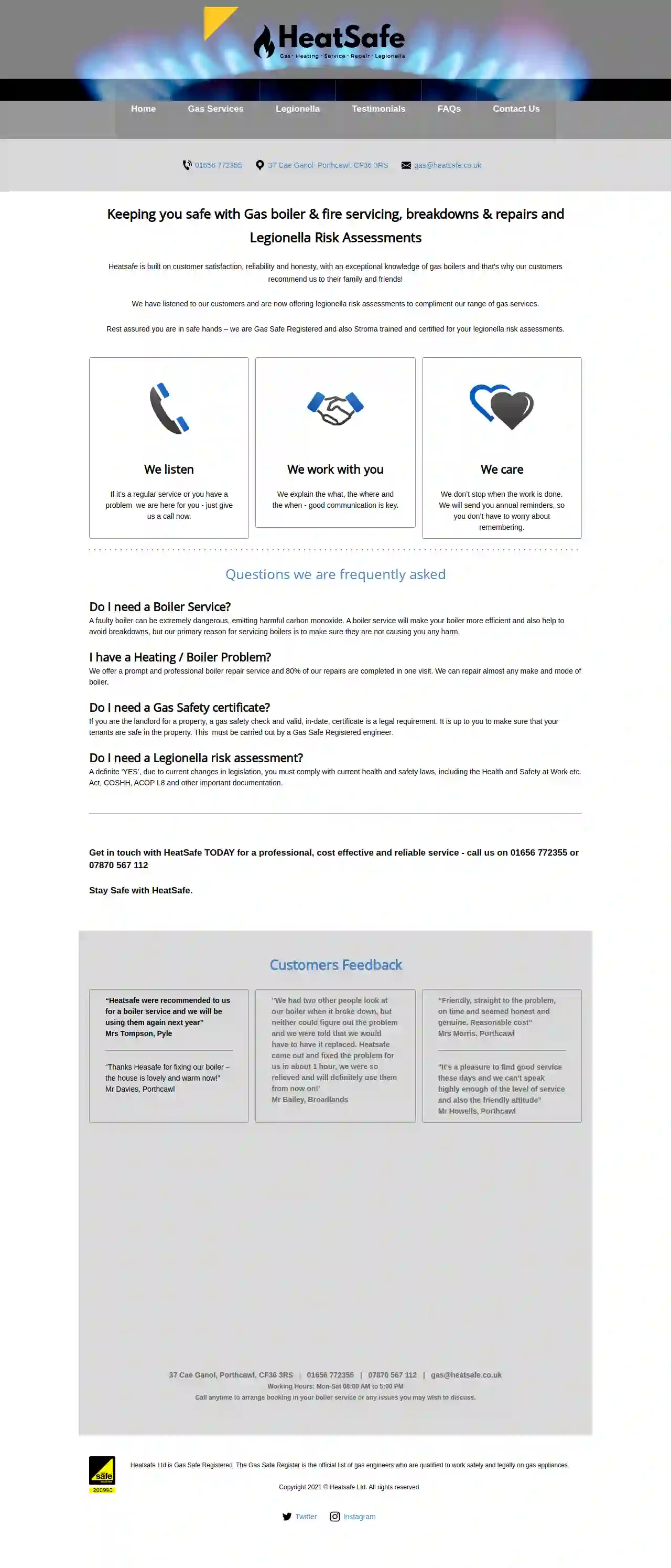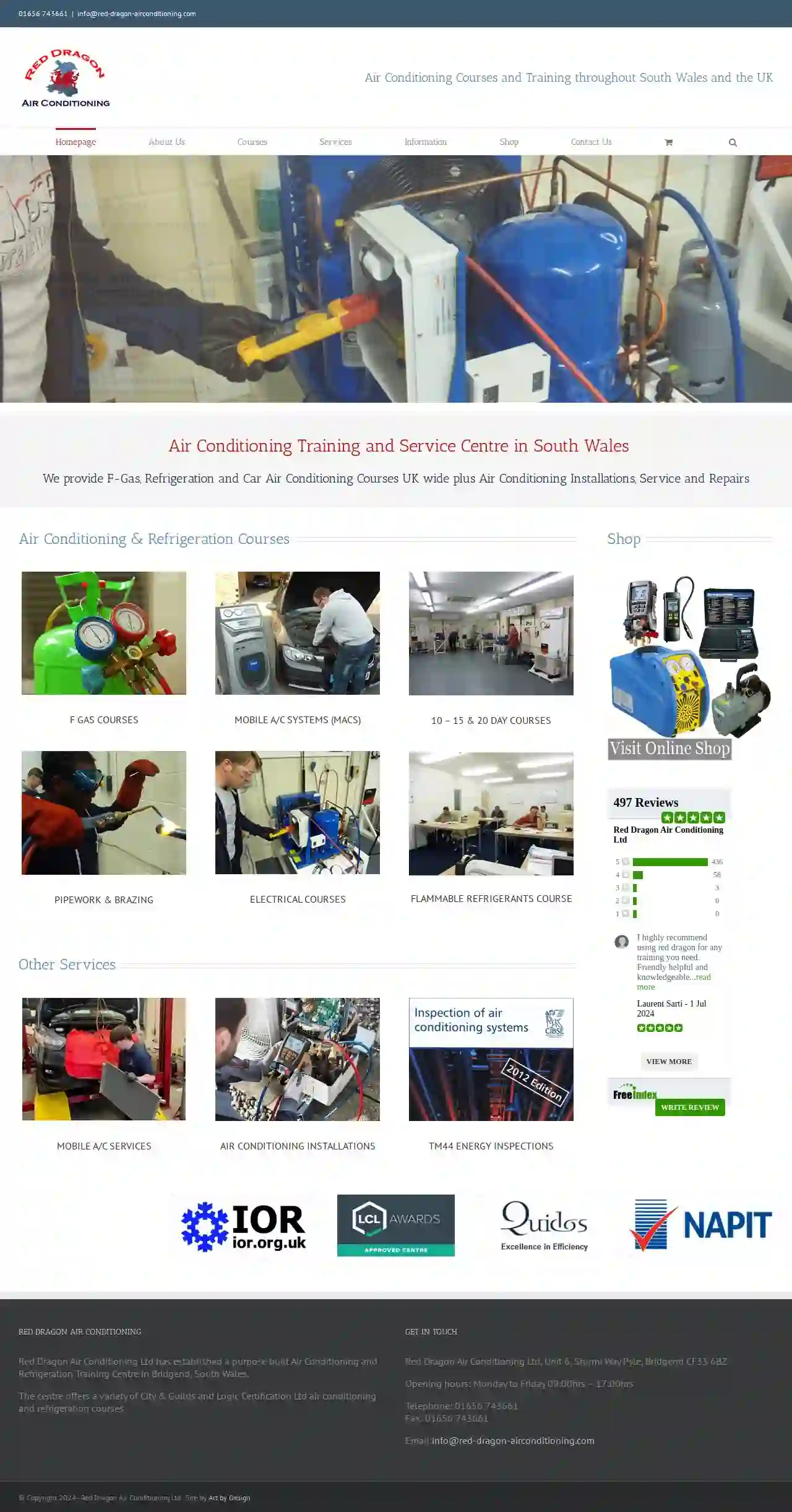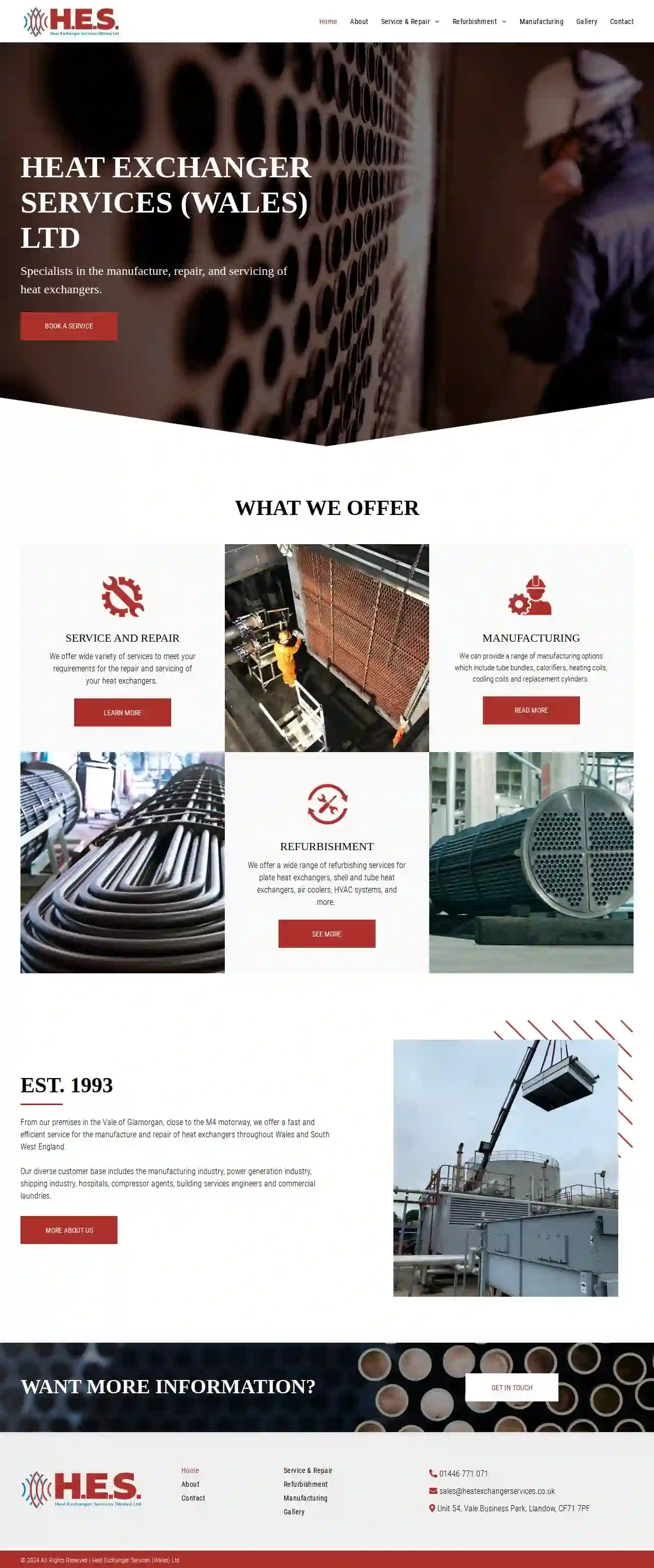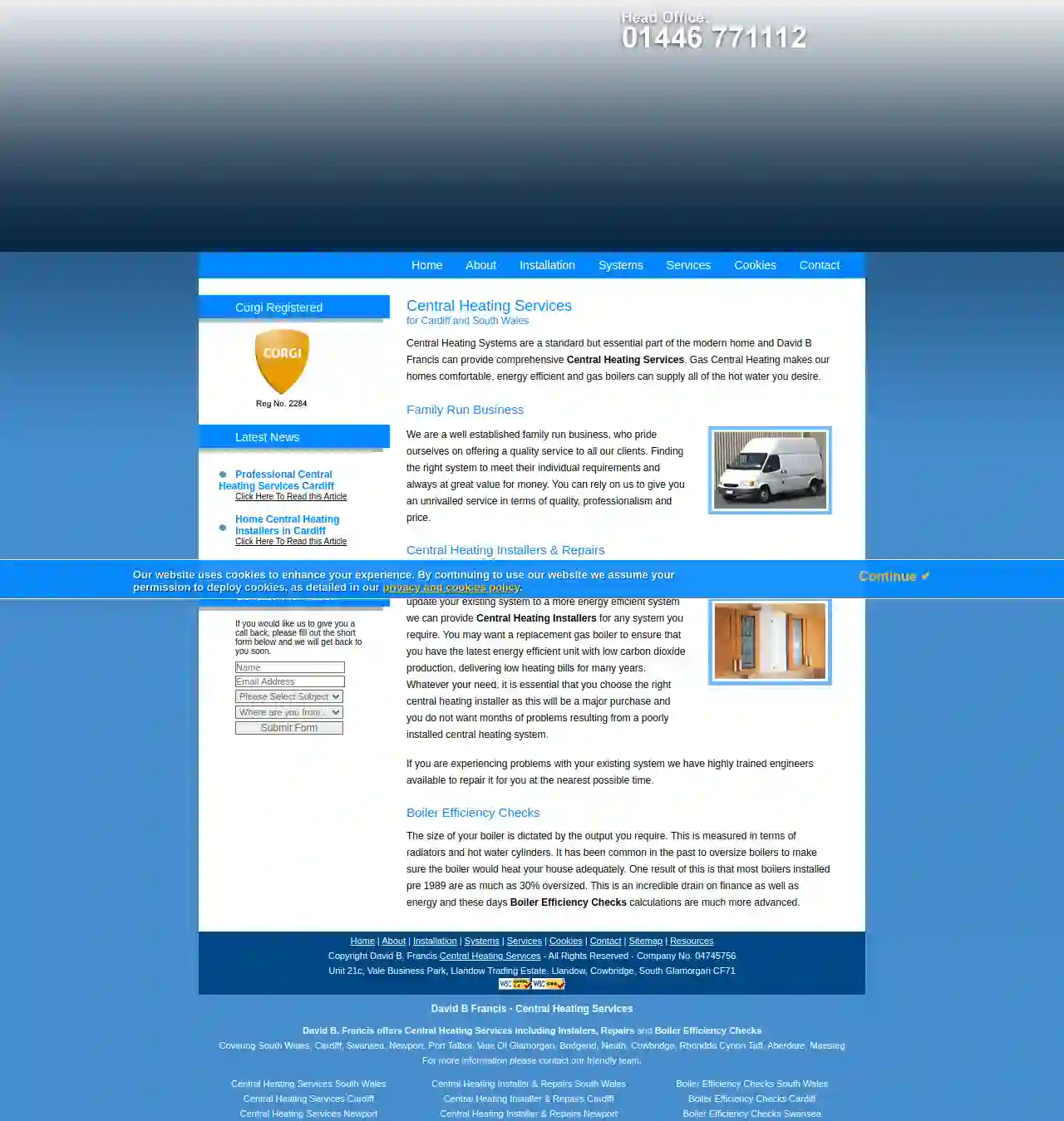Emergency HVAC Cowbridge
Find the best Emergency Furnace Repair in Cowbridge
Receive up to 3 Emergency AC Repair quotes for your project today! Compare profiles, reviews, accreditations, portfolio, etc... and choose the best deal.

Heatsafe Ltd
53 reviews37 Cae Ganol, Cae Ganol, Porthcawl, CF36 3RS, GBHeatsafe is built on customer satisfaction, reliability and honesty, with an exceptional knowledge of gas boilers and that's why our customers recommend us to their family and friends! We have listened to our customers and are now offering legionella risk assessments to compliment our range of gas services. Rest assured you are in safe hands – we are Gas Safe Registered and also Stroma trained and certified for your legionella risk assessments.
- Services
- Why Us?
- Accreditations
- Testimonials
- Gallery
Get Quote
Coolcon Ltd Car Air Conditioning Services
534 reviews8 Woodham Road, Barry, CF63 4JE, GBWelcome to Coolcon Ltd, established in 2007, we aim to provide you with a personalised service and assist you with your car's air conditioning needs. Whether your air conditioning unit is broken, is in need of a service, or a recharge then please get in contact with us! Based in Barry in the Vale of Glamorgan, our services are provided by our fully qualified engineer. It is important to us that your air conditioning system is working correctly, so that you are comfortable during hot conditions, and so that your windscreen de-mists during colder conditions. We cater for the following gases: R134a and R1234yf. Our services include Servicing, Regassing, Leak Testing, Fault Diagnosis, Repairs, and more.
- Services
- Why Us?
- Gallery
Get Quote
Red Dragon Air Conditioning Ltd
Unit 6, Sturmi Way Pyle, Pyle, CF33 6BZ, GBRed Dragon Air Conditioning Ltd has established a purpose built Air Conditioning and Refrigeration Training Centre in Bridgend, South Wales. The centre offers a variety of City & Guilds and Logic Certification Ltd air conditioning and refrigeration courses
- Services
- Why Us?
- Gallery
Get Quote
Cygnus Air Conditioning Ltd
41 reviewsPenarth, GBCygnus Air Conditioning specialise in the design, installation, commissioning and maintenance for air conditioning, refrigeration and electrical systems for commercial, domestic and heavy industry. We are looking forward to supporting Glamorgan Cricket this summer. This will be our 6th season at the club. Come and say hello! Keep up to date with us and our community on social media.
- Services
- Why Us?
- Gallery
Get Quote
Vale Energy Solutions
53 reviewsWick, 74 St James Road, CF71 7QW, GBAre your energy bills going through the roof? Is your energy bill becoming unmanageable due to high costs? If so, it may be worthwhile to insulate your home properly. You can take a step towards saving money and contributing to a sustainable environment by insulating your home today. At Vale Energy Solutions, we understand the importance of proper insulation in keeping your home warm and your energy bills low. Don't let heat escape through poorly insulated walls or roofs – take advantage of our free insulation survey and discover how we can help you. Our team of experts covers the whole of South Wales and will provide a free quote and deliver high-quality insulation solutions that offer great value for money. By investing in our Home Insulation Service, you can avoid the impact of rising electric and gas bills and ensure your home is as energy-efficient as possible. Contact Vale Energy Solutions today and experience the benefits of our exceptional service.
- Services
- Why Us?
- Testimonials
- Gallery
Get Quote
Gardner Air Services Ltd
53 reviewsPenarth, GBGardner Air Services is a family-run business specializing in domestic and commercial warm air heating solutions in South Wales. With over 40 years of experience, we've built a strong reputation as a leading provider in the region, serving the area along the M4 corridor. Our team of fully trained Gas Safe and Oftec registered engineers is equipped to handle all your gas, LPG, and oil-fired warm air heating needs. Whether you require installation, service, or repair, we're here to provide expert solutions tailored to your specific requirements. We are proud to be recognized installers of Johnson & Starley warm air heating systems, renowned for their modern condensing technology offering up to 98% efficiency. Our systems also feature a new electronic air filtration system with 95% efficiency, ensuring clean and comfortable heating for your home or business. At Gardner Air Services, we understand the importance of a reliable and efficient heating system. That's why we offer free, no-obligation quotes to discuss your needs and provide personalized recommendations. Contact us today to experience the difference of working with a trusted and experienced warm air heating specialist.
- Services
- Why Us?
- Gallery
Get Quote
Heat Exchanger Services (Wales) Ltd
52 reviewsLlandow, Unit 54, Vale Business Park, CF71 7PF, GBEstablished in 1993, Heat Exchanger Services (Wales) Ltd are specialists in the manufacture, servicing, and repair of heat exchangers. With a highly skilled and trained workforce, we're committed to delivering an excellent customer experience and providing a quality service. We offer a wide range of services, including service and repair, manufacturing, refurbishment, and chemical cleaning. Our on-site servicing team consists of experienced engineers who have worked on various industries, including steel production plants, power stations, industrial manufacturing plants, utility sites, and the marine sector. We're regularly audited in accordance with ISO 9001:2015 standard and hold up-to-date CCNSG safety passports. From our premises in the Vale of Glamorgan, close to the M4 motorway, we offer a fast and efficient service for the manufacture and repair of heat exchangers throughout Wales and South West England.
- Services
- Why Us?
- Accreditations
- Gallery
Get Quote
C.S Boxall Ltd
4.350 reviewsCardiff, GBOur Services Commercial Services Boilers Boiler Installation Boiler Repairs Central Heating Repairs Central Heating Installation Central Heating Repairs Central Heating Servicing Central Heating Repairs for Caravans & Mobile Homes Plumbing Bathroom Installation Plumbing Work Other Services AGA Rayburn Repairs & Servicing Worcester Bosch Landlords Testimonials Insights Contact Emergency Callout Office Number: 01446 772 444 24/7 Emergency Number: 07590 350650 HEATING, PLUMBING & INSTALLATION SERVICES IN CARDIFF Leave it to your local plumbing & heating experts. Get In Touch Why choose us? What sets C.S. Boxall apart? We are a large, well-established plumbing and heating company serving Cardiff, South Wales including Vale of Glamorgan, Penarth, Bridgend, Port Talbot and Caerphilly. As an industry accredited company, we provide only the highest standard of installation, service and repair for both domestic and commercial properties. We even offer a 24-hour emergency service for any problem that may arise, giving our customers peace of mind. We undertake all types of domestic plumbing, heating and electrical installations, repairs, replacements and servicing. To ensure your system is performing at peak efficiency all the time (therefore reducing your utility costs and carbon footprint) it is crucial that you should regularly maintain your system by having a routine service. Get In Touch Our services See what we have to offer Boilers explore Heating explore Plumbing explore Commercial Services explore For all your aga and Rayburn emergency repairs, servicing & breakdowns Call our experts at c.s. boxall Get In Touch 24/7 Emergency Plumbing/Heating Emergency Callouts Call us on 07590 350 650 Commercial & Industrial Services We also offer a wide range of commercial and industrial applications, creating comfortable and safe environments. Our testimonials What our clients are saying First time using CS Boxall. When I phoned, the office staff were so friendly and ready to help. They got me booked in quickly. When the engineer attend he was very polite and helpful and sorted the problem out. Would definitely recommend, a fabulous service. Donna Thomas Excellent company, I always have them for the annual boiler service which is very reasonable but more importantly they always assist with a problem. No hot water or heating last night, I left a voicemail and the engineer called at 8.15am and arrived at 10am, fault found and fixed. A big thanks to Alan for this and the office staff for sorting, would highly recommend CS Boxall Heather J Amazing service, fixed my broken washing machine pipe in no time and I got an apportionment straight away too. Will Definitely use again. Hayley Smith I must say that your boys and your team were absolutely fantastic in the quality of work, the organisation of trades were to super professional level. You must be really proud. Paul Smith I would like to say thank you for the recent shower works carried out. We are so pleased. All aspects of the work were dealt with so professionally and at all times staff were so accommodating regarding dates /times etc. Rhys was particularly helpful. Would highly recommend your company. Amanda Drew I would just like to send a huge message of thanks to your engineer who sorted out our Rayburn boiler/timer problem last Tuesday. Please tell him it’s working perfectly now and convey our gratitude to him for his perseverance . Thanks to your company too for its excellent standards of workmanship and professionalism. We have used you for a while now and have been very impressed with your high levels of service. Sally Moran Just wanted to thank you for the fantastic work that was done in our house. Both men were extremely polite and hardworking and did a brilliant job. We are also very grateful for you coming out much earlier in order for us to have heating again. Excellent Service. Thank you so much. Sarah Harper I just want to pass on my thanks and appreciation for the work that you have recently provided help to get our boiler / heating back up and running in the hospice. I'm sure that you're very busy but i really value how responsive you've been to help us. We're really grateful to be working with you and I'm sure it's the start of a successful partnership. Jason I would like to say a huge thank you to the lady who took my call yesterday and managed to get someone to us in minutes. To say yesterday was stress would be an understatement. The plumber that arrived was so calm and collected and I just wanted to thank the company so much and apologise for my highly emotional state. No one ever expects to open their front door and be faced with that and especially so close to Christmas... on the day you are due to exchange on the house! Thanks again and we will be recommending you to everyone!!! Beca Griffiths Can I please also pay a compliment to David for his outstanding work yesterday and thank you all for getting the heating working much sooner than I'd anticipated. Jon Taylor I wanted to say once again how helpful the two men were. They answered all my questions and were just very considerate. I have been so pleased with your company and would highly recommend you. Clare Hockings I would like to thank you for the installation job last Thursday. Your men did a great job. Mine is not an easy property to work on or in and they were efficient and professional and very prompt in their timing of the work in spite of all. They also did go above and beyond with details and did not treat me like a lamebrain civilian which made a change. Judith Browne
- Services
- Why Us?
- Accreditations
- Testimonials
- Gallery
Get Quote
Cardiff & Vale College Apprenticeship
City Centre Campus, Dumballs Road, Cardiff, CF10 5FE, GBCardiff and Vale College is one of the largest colleges in the UK, delivering high quality education and training within the Capital Region of Wales. We have more than 30,000 learners each year across full-time and part-time college courses, university qualifications and apprenticeship programmes, along with dedicated training provision for employers. We develop skilled and employable people – with some of the best student success rates in the sector and a focus on experiences that ensure our learners stand out and progress. Inspirational. Inclusive. Influential. We are Cardiff and Vale College.
- Services
- Why Us?
- Gallery
Get Quote
David B Francis
416 reviewsUnit 21c, Vale Business Park, Llandow Trading Estate, Llandow, Cowbridge, South Glamorgan, CF71, GBDavid B. Francis Central Heating Services is a well-established family-run business that provides comprehensive central heating services in Cardiff and South Wales. We pride ourselves on offering a quality service to all our clients, finding the right system to meet their individual requirements and always at great value for money. Our team of highly trained engineers is available to install, repair, and maintain central heating systems, as well as provide boiler efficiency checks. We are Corgi registered and cover a wide area, including South Wales, Cardiff, Swansea, Newport, Port Talbot, Vale of Glamorgan, Bridgend, Neath, Cowbridge, Rhondda Cynon Taff, Aberdare, and Maesteg.
- Services
- Why Us?
- Accreditations
- Gallery
Get Quote
Over 12,692+ HVAC Businesses on our platform
Our HVAC companies operate in Cowbridge and beyond!
HVACCompaniesHub has curated and vetted Top HVAC Businesses near Cowbridge. Find the most trustworthy pro today.